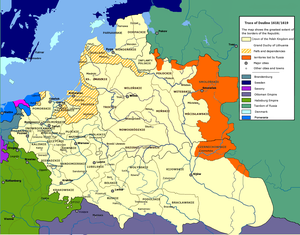
The Truce of Deulino (also known as Peace or Treaty of Dywilino) concluded the Polish–Russian War of 1609–1618 between the Polish–Lithuanian Commonwealth and the Tsardom of Russia. It was signed in the village of Deulino [ru] on 11 December 1618 and took effect on 4 January 1619.
The agreement marked the greatest geographical expansion of the Commonwealth (0.99 million km), which lasted until the Commonwealth conceded the loss of Livonia in 1629. The Commonwealth gained control over the Smolensk and Chernihiv Voivodeships. The truce was set to expire within 14.5 years. The parties exchanged prisoners, including Filaret Romanov, Patriarch of Moscow.
Władysław IV, son of Commonwealth king Sigismund III Vasa, refused to relinquish his claim to the throne in Moscow. Therefore, in 1632, when the Truce of Deulino expired and Sigismund III died, hostilities were immediately resumed in the course of a conflict known as the Smolensk War, which ended in the Treaty of Polyanovka in 1634.
References
- ^ Lerski, George J.; Jerzy Jan Lerski; Piotr Wróbel; Richard J. Kozicki (1996). Historical Dictionary of Poland, 966–1945. Greenwood Publishing Group. p. 110. ISBN 0-313-26007-9.
- ^ Cooper, J. P. (1979). The New Cambridge Modern History. CUP Archive. p. 595. ISBN 0-521-29713-3.
- ^ Stone, David R. (2006). A Military History of Russia. Greenwood Publishing Group. p. 31. ISBN 0-275-98502-4.
- Cooper, J. P. (1979). The New Cambridge Modern History. CUP Archive. p. 605. ISBN 0-521-29713-3.
| Polish truces and peace treaties | |||||||||||
|---|---|---|---|---|---|---|---|---|---|---|---|
| Kingdom of Poland | |||||||||||
| Polish–Lithuanian Commonwealth |
| ||||||||||
| Second Polish Republic | |||||||||||